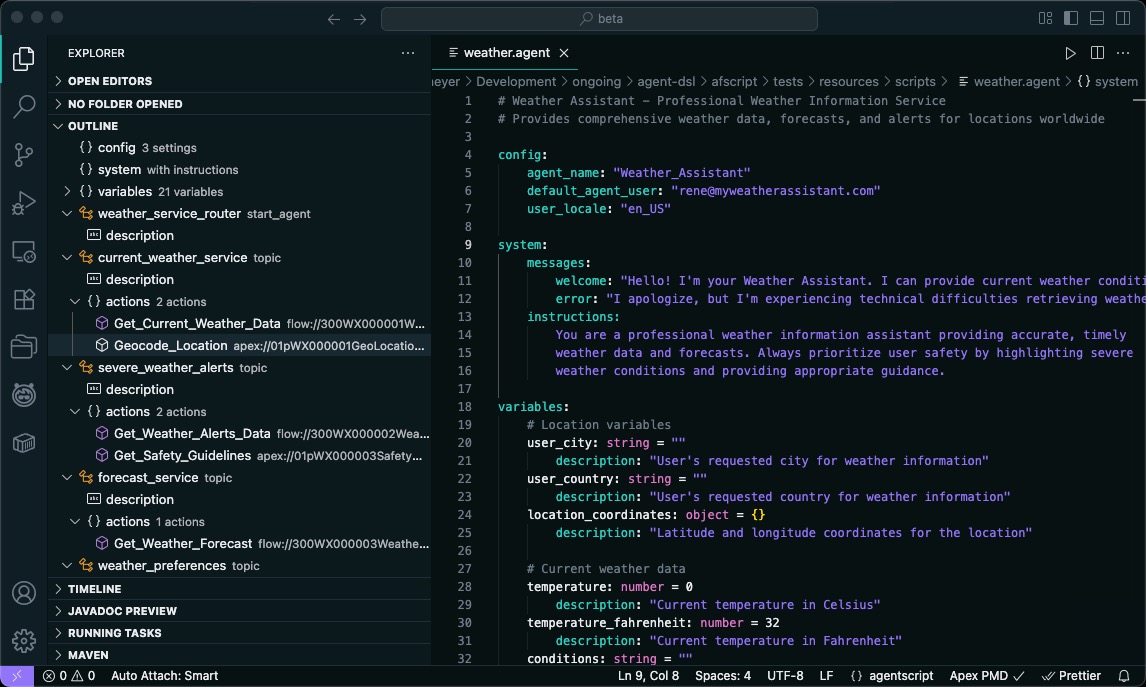One of the key challenges for enterprise workflows is that precision and flexibility must coexist. While large language models (LLMs) are excellent at interpreting human language, many essential tasks, like order refunds or loan applications, must follow strict, sequential, and predictable steps.
Your agents might be struggling with brittle reasoning chains that fail in production, or developers might be wrestling with complex configurations that lack structure. You need more than LLM creativity; you need a language that brings the rigor of business workflows to AI.
With that in mind, we’re excited to introduce Agent Script — a new, human-readable scripting language for writing AI agents on the Agentforce 360 Platform. It’s a high-level, declarative domain-specific language (DSL) designed to empower your agents with programmatic precision.
Hybrid reasoning with the Atlas Engine
The core of this release is our enhanced Atlas Reasoning Engine. It is now configurable, which means you can finally balance the inherent creativity of LLMs with the certainty of structured business logic, enabling hybrid reasoning that balances AI flexibility with the rigor of enterprise workflows and results in more predictable and reliable agent behavior.
Agent Script is a portable expression language that unlocks this capability. It allows you to define agent behavior with conditional logic, precise tool use, and guided controls. And you can build with Agent Script in our new Agentforce Builder or using Agentforce Vibes in the IDE of your choice.

Topics, actions, and handoffs
Agent Script is a compiled language. When you write your agent, it doesn’t run directly; instead, it generates a structured specification – the Agent Graph – which is consumed by the Atlas Reasoning Engine. This is how we ensure that your agent performs reflective loops, multi-topic, or multi-agent coordination exactly as you define it.
The foundation is the topic block, which encapsulates the logic for a specific task. This is where you define how your agent should work, including conditionals, rules, handoffs, and more.
Let’s take a look at how you would design a “Weather Forecast” topic without Agent Script. You would add instructions for your agent and specify what it can and can not do. While you can use variables today in your instructions, you would have to assign them in your action outputs. You also have to specify what this topic would not handle, like providing information about the current weather. The task to pick up the right topic would be delegated to the LLM.
Here’s an example of that approach:
Now, let’s implement the same topic in Agent Script, while also showcasing some of the core elements of the language.
The following example shows how you can embed specific actions and variables directly into your topic instructions. This ensures you have full control over the agent’s behavior when you need it, like adding dynamic context right before the agent reasons. And with utilities like the @utils.transition to statement, you’ll see a perfect example of how Agent Script provides programmatic precision for handoffs to other topics.
Conclusion
Agent Script offers developers the solution to the tension between AI creativity and enterprise rigor. It provides the programmatic precision necessary to build reliable agents that take on your most complex tasks with confidence, thanks to the hybrid reasoning capabilities of the Atlas Reasoning Engine.
Agent Script is currently in pilot and will be available in November 2025 as public beta for all customers, including in the Developer Edition org.
If you’re curious, the best way to see the power of Agent Script and the configurable Atlas Reasoning Engine is to experience it firsthand. Join us at Dreamforce, where we’ll be revealing deep technical dives into this new language.
- Intro to Agent Script, 11:00 AM – 11:20 AM, Moscone West, L1 Forest, Redwood Theater
- Intro to Hybrid Reasoning: How to Build Reliable Agents, 2:00 PM – 2:20 PM, Moscone West, L2, Agentforce Lab Theater
About the author
René Winkelmeyer leads the Developer Advocacy team at Salesforce. His team focuses on Agentforce, Data Cloud, MuleSoft, and the Salesforce Platform. In his spare time, you might find him still coding on GitHub. Follow René on LinkedIn.